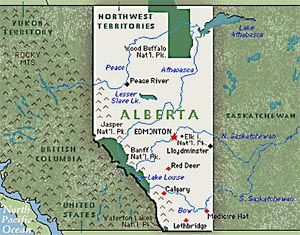
EDMONTON (CUP) – A Kyoto Protocol supporter called the Alberta government “whiners” for their unwillingness to sign the accord during a debate at last Saturday’s Eco-Conference at the University of Alberta.
The debate got off to a rocky start for the provincial government after Environment Canada representative Stephen McLellan’s failed to show up until 10 minutes before the debate was scheduled to end. McLellan was allowed to address the audience but did little to deflect the criticism focused on Alberta’s Assistant Energy Minister, John Donner.
The debate, “The Kyoto Question: To Sign or Not to Sign?” was held primarily to bring the provincial and federal governments together to debate whether or not the Kyoto Protocol, an international environmental protocol aimed at reducing greenhouse gas emissions, should be ratified.
McLellan to wrapped up the debate with his opening statement, in which he reiterated the need for a “workable, fair approach and a lot of common ground in order to make this work.”
The federal government is currently talking with the provincial governments regarding the ratification of the Kyoto Protocol. Alberta is providing the strongest opposition, as oil and gas revenue play a major role in the province’s economy.
Other debaters included Robert Macintosh, senior adviser to the Pembina Institute, an environmental policy organization; and Jim Badger, economic development adviser for Treaty Eight, one of the largest land settlements undertaken by the Canadian government with the First Nations.
Both of these panelists held more environmentally conscious, left-wing viewpoints than Donner, and focused their arguments toward his responses.
One of the major issues Alberta has with the Kyoto Protocol, said Donner, is that it has been described as “a global solution to a global problem,” when the accord covers only about 35 per cent of the world’s emissions.
“We’re looking for a technologically driven solution where the economy can continue to flourish and grow. This is all about sharing the pain,” said Donner.
Macintosh followed Donner’s statement with an attack on the Alberta government.
“Increasingly, I think the provincial government’s stance has not been “?to sign or not to sign,’ but “?to whine or not to whine,'” said Macintosh.
Macintosh criticized some of the major “anti-action arguments” employed by the Alberta government, including the notion that “the economy and the world will collapse. It’s like there are only two choices: reduction [of greenhouse gases] or economic well-being.”
“The Alberta plan is not an option, as it is totally voluntary,” said Macintosh. “We’re falling behind the rest of the world. The longer we wait to develop non-carbon intensive technologies, the harder it will be to climb out of this mess.”
Badger was encouraged by the audience throughout much of the debate with loud applause and cheers. He used the debate to express his avid positions on the environment and the provincial government’s “fear-mongering.”
Badger summarized his view of the Kyoto problem in his opening statement. “I don’t see what’s so wrong with millions of people in Canada who want their children to live with clean air and clean water. Correcting the problem is likely to be expensive and is definitely controversial, but the state of the world’s environment is fragile.”


